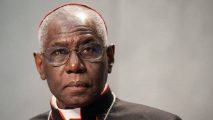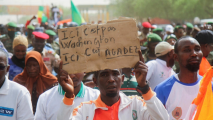Categories
Recent Posts
- Cameroon is broken: Who can fix it?
- Cameroonian beer and soft drinks exports soar by 73% and 46.6% in 2022
- Southern Cameroons Crisis: 2 teachers abducted in the North West
- World Bank says despite high potential, 75 vulnerable economies face ‘Historic Reversal’
- Cardinal Robert Sarah says Western prelates have lost their nerve
Archives
- April 2024
- March 2024
- February 2024
- January 2024
- December 2023
- November 2023
- October 2023
- September 2023
- August 2023
- July 2023
- June 2023
- May 2023
- April 2023
- March 2023
- February 2023
- January 2023
- December 2022
- November 2022
- October 2022
- September 2022
- August 2022
- July 2022
- June 2022
- May 2022
- April 2022
- March 2022
- February 2022
- January 2022
- December 2021
- November 2021
- October 2021
- September 2021
- August 2021
- July 2021
- June 2021
- May 2021
- April 2021
- March 2021
- February 2021
- January 2021
- December 2020
- November 2020
- October 2020
- September 2020
- August 2020
- July 2020
- June 2020
- May 2020
- April 2020
- March 2020
- February 2020
- January 2020
- December 2019
- November 2019
- October 2019
- September 2019
- August 2019
- July 2019
- June 2019
- May 2019
- April 2019
- March 2019
- February 2019
- January 2019
- December 2018
- November 2018
- October 2018
- September 2018
- August 2018
- July 2018
- June 2018
- May 2018
- April 2018
- March 2018
- February 2018
- January 2018
- December 2017
- November 2017
- October 2017
- September 2017
- August 2017
- July 2017
- June 2017
- May 2017
- April 2017
- March 2017
- February 2017
- January 2017
- December 2016
- November 2016
- October 2016
- September 2016
- August 2016
- July 2016
- June 2016
Featured
Most Commented Posts
 4 Anglophone detainees killed in Yaounde
4 Anglophone detainees killed in Yaounde
19 comments Chantal Biya says she will return to Cameroon if General Ivo Yenwo, Martin Belinga Eboutou and Ferdinand Ngoh Ngoh are sacked
Chantal Biya says she will return to Cameroon if General Ivo Yenwo, Martin Belinga Eboutou and Ferdinand Ngoh Ngoh are sacked
13 comments Anglophone Nationalism: Barrister Eyambe says “hidden plans are at work”
Anglophone Nationalism: Barrister Eyambe says “hidden plans are at work”
12 comments The Anglophone Problem – When Facts don’t Lie
The Anglophone Problem – When Facts don’t Lie
12 comments Largest wave of arrest by BIR in Bamenda
Largest wave of arrest by BIR in Bamenda
10 comments
Latest Tweets
Featured
-

Cameroon is broken: Who can fix it?
-

Cameroonian beer and soft drinks exports soar by 73% and 46.6% in 2022
-

Southern Cameroons Crisis: 2 teachers abducted in the North West
-

World Bank says despite high potential, 75 vulnerable economies face ‘Historic Reversal’
-

Cardinal Robert Sarah says Western prelates have lost their nerve
-

Iran launches drones at Israel in retaliatory attack
-

Thousands protest in Niger demanding immediate withdrawal of US troops
© Cameroon Concord News 2024





20, November 2017
Zimbabwe: Mugabe defies own party, refuses to resign 0
Speaking while under house arrest, Zimbabwe’s embattled President Robert Mugabe has shocked the nation by making no mention of resignation despite a military takeover and a looming noon deadline set by his own party for him to cede power.
The 93-year old president delivered a 20-minute address Sunday on live television, hours after his Zanu-PF Party sacked him and urged the leader to step down by noon (1000 GMT) on Monday or face impeachment.
Zimbabweans, who widely expected Mugabe to announce his resignation in the address, had gathered in public places across the capital, Harare, to watch the speech.
However, much to their disbelief, Mugabe, who has ruled Zimbabwe for nearly four decades, offered no concessions to his opponents, and even pledged to preside over a special Zanu-PF congress scheduled for next month.
The president acknowledged criticism from Zanu-PF, the military and public, but said the events of last week were not “a challenge to my authority as head of state and government.”
“Whatever the pros and cons of how they [the army] went about their operation, I, as commander-in-chief, do acknowledge their concerns,” he said.
The long-running president stressed the need to return normality to the African state, but made no mention of demands from the public and from his own party, to resign as president.
Angered by the speech, Chris Mutsvangwa, head of the influential war veterans’ association, said plans to impeach Mugabe in parliament would now go ahead, and that there would be mass protests on Wednesday.
“That speech has nothing to do with realities,” he said, calling on people to go back to the streets.
Both houses of Zimbabwe’s parliament are due to convene on Tuesday for a debate over the impeachment bid, which would require a two-thirds majority in both chambers.
The political crisis began in the South African county after Mugabe sacked his vice president, Emmerson Mnangagwa, two weeks ago.
The sudden move angered army commanders and led to the military takeover last week. The commanders considered Mugabe’s sudden decision as an attempt to position his wife, Grace Mugabe, as his successor.
She has not been seen since the takeover.
It was thought that the army had managed to take power in a “bloodless transition” coup, but it insists that it has no intention of taking permanent control of government and that it is an operation to root out “criminals around (Mugabe) who are committing crimes.”
Mnangagwa, who was appointed interim leader of the Zanu-PF, is widely expected to take over from Mugabe as president.
Culled from Presstv